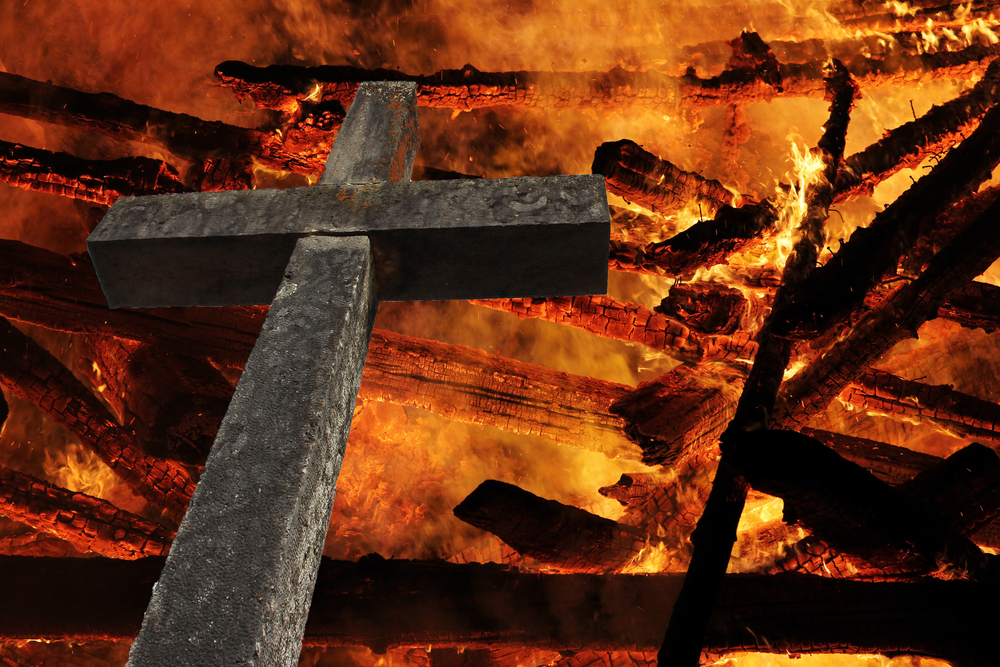Synagogues and Jewish schools targeted by firebombings and shootings. Muslims attacked outside their mosque. Dozens of churches burned to the ground. Headlines like these over the past few months bear witness to a troubling rise in violence perpetrated against religious communities in Canada.
I say troubling but not, perhaps, surprising. Today the minority of Canadians regularly active in organized religion (any religion) are just that—a minority. As of 2019, less than a quarter (23%) of Canadians attend religious services on even a monthly basis, according to Statistics Canada. A 2022 Angus Reid poll puts the number even lower, at just 15%.
As the number of actively religious people in Canada shrinks, there is a corresponding rise in people holding mostly negative views of religion and faith communities in Canada. The same Angus Reid poll mentioned above reports that nearly a quarter of Canadians (22%) consider the contributions of religious communities “more bad than good” or “very bad”—a number that has risen 5% in just four years. And of course, even among those with positive views of religion generally, there are some specific religions they distrust; Canadians are “more likely to believe,” for example, that Roman Catholicism, evangelical Christianity, and Islam are on the whole damaging to Canadian society.
The rising distrust and growing intolerance of religious groups in Canada have become manifest in a number of ways, with government policy and laws increasingly driving religious people out of the public arena. Like too many other minority groups throughout history, religious Canadians are slowly becoming personae non gratae in wider society.
Consider the Quebec teacher removed from the classroom for wearing a hijab. Consider also the decision of the Supreme Court of Canada permitting provincial law societies to ban graduates of an evangelical university from practicing law. Then there’s the decision of an Ontario court that physicians of faith (and no faith) must be forced to participate in procedures they disagree with for moral reasons (like abortion and physician assisted suicide) by providing an “effective referral.” The implications of such actions and many others are clear: religious people are no longer welcome in Canada. Such beliefs are simply “un-Canadian.”
The slow erosion of religious freedom in Canada has been mirrored by the demonization of religious Canadians as intolerant and hateful—a problem to be shut up or shut out. And now we are seeing the effects of that dehumanization, as religious groups increasingly become the victims of violence and hate crimes.
CBC’s recent report on a multiyear spate of arson attacks on Christian churches in Canada throws the subject into stark relief. “At least 33 Canadian churches have burned to the ground since May 2021,” explains a CBC News headline. “Only 2 were accidents.”
Many of these crimes took place in reaction to the 2021 announcement of the potential discovery of unmarked graves at former residential schools—institutions sponsored by the government and operated by Roman Catholic, Anglican, United, and Presbyterian churches. The appalling injustices committed against First Nations people in Canada during the residential school era are well-documented and cannot be excused. But neither should the burning of Christian places of worship.
And yet downplaying such crimes has become common. Burning churches may be wrong but it is “understandable,” or so we were initially told by the prime minister and one of his former political advisers. Several years on, the same sentiment remains: CBC’s most recent story includes comment from a professor who, while acknowledging that arson isn’t justified, nevertheless goes on to minimize the violence by saying it has given people “a voice.”
This normalization of violent crime against religious people has dire consequences for society. In this model, “protest” becomes conflated with justifiable violence—and indiscriminate violence at that. Churches from Christian traditions with no connection to the residential schools have been attacked. And First Nation Christians are likewise victimized as churches on reserves are destroyed.
Of course, not all the attacks mentioned in CBC’s report are likely to have been in response to residential schools. “Most of the fires remain unsolved,” the story reads. And even “in those where charges have been laid,” the report continues, “police say no clear motive has been established.” Motives might differ but the effect is the same: the destruction of Christian places of worship and the intimidation of believers, and a lethargic official response.
CBC’s report is focused primarily on churches that have been destroyed in the past few years, but there have been plenty of other churches targeted by arsonists but not successfully burned to the ground. This past June, for example, a Lutheran church in Edmonton was broken into and a cross was removed from the narthex wall. That cross and a religious text were then placed on the floor and set on fire. The fire eventually died out but not before causing significant smoke damage to the building.
It’s not a story that garnered secular media attention. And there are countless other smaller acts of anti-religious violence that likewise go unreported day after day. About 10 years ago, I recall arriving slightly late to church in Winnipeg on a Sunday morning. I was shocked to find the exterior walls adorned with graffiti invoking Satan and praising the Islamic State (who were then in the news for the mass extermination of Christians and other minorities in the Middle East). Slipping into the pew, I tried to focus on the service—the liturgy and hymns, the scripture readings, and the sermon—but a sense of unease remained. Might not someone with such a strong anti-Christian animus return to do violence in person?
It’s not mere anxiety either. We’ve seen plenty of murderous attacks on places of worship in other parts of the world. In January 2017, Canada experienced it as well. Muslims at a mosque in Quebec City had finished evening prayer when a gunman entered and killed six people and seriously injured another five. A number of others present suffered minor injuries—to say nothing of the trauma they experienced. The perpetrator’s “crimes were truly motivated by race,” the judge later declared, “and a visceral hatred toward Muslim immigrants.”
We have seen too much hate in recent years in Canada, and much of it directed toward people of faith simply because of their faith. Our society increasingly bends away from tolerance toward polarization. We dehumanize those who believe and think differently than we do, castigating them as evil and deserving of censure … or worse. And then we justify ourselves by characterizing our hate as “protest.”
Hate led too many people in Canada to celebrate publicly the atrocities perpetrated by Hamas against Israeli civilians on October 7. Hate motivates continued acts of antisemitism across the country. Hate has led to violent attacks on Muslims in the wake of war between Israel and Palestine.
It’s the same hate that declares today’s Christians deserving of having their churches burned to the ground en masse.
If we do not find a way to rein in that hate—to learn anew what it means to tolerate those who believe and think differently than we do, and to do so with respect—then I’m very much afraid we’ll see the horrors of the Quebec City attack repeated in churches and synagogues and mosques and other places of worship across our country.
“Do not be overcome by evil, but overcome evil with good” (Romans 12:21)

